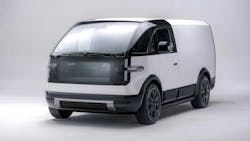EV-Van Maker Canoo Liquidating Operations Under Chapter 7 Bankruptcy
Canoo, the electric delivery vehicle startup which raced against time and insolvency despite infusions of incentive funding and actual van orders from Walmart and NASA, has been crushed under mounting debt and decided to cease all operations immediately.
The Texas-based Canoo announced Friday it had filed a petition for Chapter 7 bankruptcy, which is liquidation of the company’s assets and distribution of remaining proceeds to creditors, in Delaware federal court. News reports indicated that the company, which previously had received promises of hundreds of millions in funding from investors and government incentives to locate manufacturing in the U.S., was reportedly down to less than $100,000 in cash and millions in debt.
In its press release announcing the demise, Canoo said it could not gain a federal financial lifeline as a last resort.
“Despite being American-made, successfully delivering to such esteemed organizations as NASA, the Department of Defense, The United States Postal Service, the State of Oklahoma and having agreements with Walmart and others, Canoo has unfortunately been unable to secure financial support from the U.S. Department of Energy’s Loan Program Office,” the statement reads. “Recently, the company’s executives were in discussions with foreign sources of capital. In light of the fact that these efforts were unsuccessful, the board has made the difficult decision to file for insolvency.”
Since 2023, numerous renewable energy, battery or EV startups have filed for bankruptcy in addition to Canoo’s liquidation. Those include Fisker, Lordstown Motors, Proterra and solar manufacturer SunPower. Some might have hope of re-emerging under Chapter 11 protection, while Canoo’s fate is certain under Chapter 7.
“We would like to thank the company’s employees for their dedication and hard work. We know that you believed in our company as we did. We are truly disappointed that things turned out as they did,” Canoo Inc. CEO and leading investor Tony Aquila said in the statement. “We would also like to thank NASA, the Department of Defense, the United States Postal Service, the State of Oklahoma and Walmart for their belief in our products and our company. This means a lot to everyone in the company.”
Despite recent desperate moves such as a 1-for-20 reverse stock split and furloughs and idling the factory, prior to December 2024 Canoo’s financial standing was troubled but hopeful. The company boasted of new partnerships and distribution, including a service and parts deal with Northside Truck & Van in the United Kingdom, as well as activation of its Oklahoma City production facility.
Canoo relocated its corporate headquarters from California to northern Texas in September. “Canoo is actively hiring for numerous positions across both Texas and in Oklahoma City,” reads the press release dated Sept. 9, 2024.
Nearly three years ago, Canoo was warning of financial distress but then releasing announcements on several supply deals. In July 2022, Walmart ordered 4,500 eDelivery vans.
About the Author
Rod Walton, EnergyTech Managing Editor
Managing Editor
For EnergyTech editorial inquiries, please contact Managing Editor Rod Walton at [email protected].
Rod Walton has spent 17 years covering the energy industry as a newspaper and trade journalist. He formerly was energy writer and business editor at the Tulsa World. Later, he spent six years covering the electricity power sector for Pennwell and Clarion Events. He joined Endeavor and EnergyTech in November 2021.
Walton earned his Bachelors degree in journalism from the University of Oklahoma. His career stops include the Moore American, Bartlesville Examiner-Enterprise, Wagoner Tribune and Tulsa World.
EnergyTech is focused on the mission critical and large-scale energy users and their sustainability and resiliency goals. These include the commercial and industrial sectors, as well as the military, universities, data centers and microgrids. The C&I sectors together account for close to 30 percent of greenhouse gas emissions in the U.S.
He was named Managing Editor for Microgrid Knowledge and EnergyTech starting July 1, 2023
Many large-scale energy users such as Fortune 500 companies, and mission-critical users such as military bases, universities, healthcare facilities, public safety and data centers, shifting their energy priorities to reach net-zero carbon goals within the coming decades. These include plans for renewable energy power purchase agreements, but also on-site resiliency projects such as microgrids, combined heat and power, rooftop solar, energy storage, digitalization and building efficiency upgrades.

